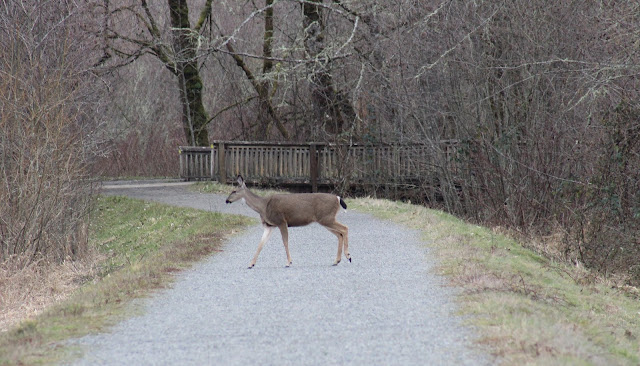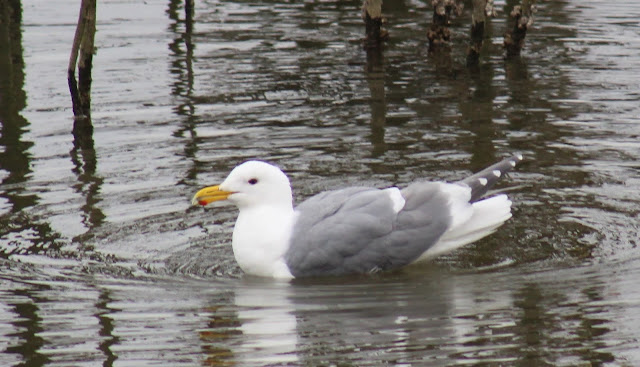It was another cool morning, and I went
out to Nisqually National Wildlife Refuge for the weekly walk. Neither of the regular FWS Volunteers, Phil
Kelley and Shep Thorp, was available, but a group of over two dozen
participants assembled at the Visitors’ Center at 8 a.m. The bird walk was ably led by Ken Brown from
the Black Hills Audubon Chapter. I kept
the eBird checklist for the day, as we birders followed the usual path through
the Heritage orchard, around the graveled service road to the boardwalk along
the Visitors’ Center pond to the Twin Barns.
Several birders continued out onto the north dike, separating the estuary
restoration area from the upland fields and freshwater marsh, and further out
on the estuary boardwalk. We returned to
the Nisqually River overlook and back on the eastern boardwalk to the Visitors’
Center.
As we approached the orchard, we were
treated to a backlit view of a male Varied Thrush.
This species is common enough in the
Douglas fir timber and a few hundred feet in elevation higher than this
sea-level Refuge. But, we rarely see one
on the Wednesday walks. The recent snows
and cold weather have pushed this handsome bird down slope to where the birders
could get a view of him.
The orchard area is also a good place
to sort through the wintering sparrow flock.
 |
| "Just" a Song Sparrow . . . |
As we arrived at the Twin Barns loop
boardwalk trail, other birds piqued the interest of the photographers in the
group.
 |
| The Golden-crowned Sparrows have been grazing on the trail-side grasses |
The boardwalk itself follows along the
west bank of the Visitors’ Center pond, affording studies of the waterfowl.
 |
| Big ol' Honker . . . |
 |
| Drake Shoveler |
This drake Ring-necked Duck shows the
faint brownish “ring” at the base of the neck that 19th-Century
ornithologists used to describe the species as “Ring-necked”, rather than the
more obvious “Ring-billed” duck.
 |
| Ring-necked Drake |
Birds aren’t the only draw for folks on
the walk.
 |
| Black-tailed doe- Odocoileus hemionus columbianus |
After “Elevenses” at the Twin Barns,
some of the group calls it a morning, and the remainder head out onto the north
dike. We look for Marsh Wrens, Bitterns,
and Virginia Rails, and get to study the plumages of the ubiquitous Great Blue
Herons.
 |
| Adult herons showing their fine plumes |
 |
| Birds from last year's hatch aren't quite as showy |
At the west end of the dike, the
majority of the Wednesday Walkers have turned about, and the hard-core birders
that remain will continue out to the end of the 1-mile-long Estuary boardwalk
to the observation deck on the east bank of McAllister Creek, for views of the
salt-water species. It is along here
that we can practice (or hone) our gull identification skills. The large, pink-legged gulls in this part of
the Left Coast are progeny of birds in a “Hybrid Zone” between two gull
species. This gull could easily be identified
as a Glaucous-winged Gull by some, but shows somewhat darker primary feathering
than might a “pure” GWGU.
 |
| Glaucous-wing, or a Hybrid? |
This bird is more easily identified as
a hybrid between the Western and Glaucous-winged species, with more dark in the
wingtips than a Glaucous-wing,
and having fairly ‘dirty’ head, which an adult Western
Gull wouldn’t have this time of year.
There is no mistaking an adult
Ring-billed Gull.
 |
| . . . 'cause it has a ring around the end of its bill |
At this tide level, we get to see the
Harbor Seals at their haul-out on one of the remaining salt marsh islands in
the McAllister Creek estuary.
All winter, there have been small
flocks of Least Sandpipers. We sort
through the flocks of Leasts for the odd Western Sandpiper, but none were seen
today.
 |
| Least Sandpipers have yellow legs . . . |
Greater Yellowlegs have been regular
along the boardwalk all winter, and are beginning to molt into their Spring
finery.
 |
| . . . as do Yellowlegs |
On our return, we were happily
surprised to see the Bittern that eluded us on our way out.
The Nisqually Refuge Volunteers lead a
Bird Walk every Wednesday morning. Meet
at the Visitors’ Center at 8 a.m. and join us for a fun morning of birding.
Nisqually NWR eBird Checklist is Here



















No comments:
Post a Comment